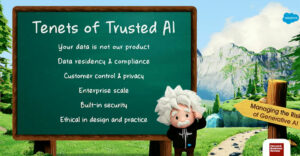
Those who cannot remember the past are condemned to repeat it, wrote George Santayana, and if you’ve covered technology as long as I have, you know that the cycles of repetition become shorter with each passing year. When it comes to CRM, we’re seeing it again in the form of social CRM: companies are making the same mistakes they made at the start of the CRM era.
Does no one look to the past? Or do they see SCRM as such a revolutionary leap forward that the past no longer applies?
Probably both. But smart practitioners of the CRM arts know that there are lessons from the “traditional CRM” era that stand the test even as SCRM is heralded as the next great thing. Sadly, many of those lessons have yet to be learned by many rolling out CRM — which makes it likely we’ll see the same level of SCRM failure in the near future that we saw in CRM’s not-so-distant past.
Here are a few lessons learned during the CRM era that can be applied to SCRM:
1. It’s Not a Panacea
CRM was seen by a lot of businesses as the technology that would fix all of their broken processes and would do it at the flip of the switch. What these businesses found instead, was that all of their broken processes were still broken even as they were automated. You were failing before, now you’re just failing faster and more efficiently.
SCRM is being viewed today in some cases as a cure for what ails CRM. But it’s still not a silver bullet that will magically repair the things that aren’t working without some real work to map the technology and how you use it to the areas that need improvement within your organization. Unless you put the mental work in to understand your goals and what you hope to achieve with SCRM, you’ll be failing faster, more efficiently — and you’ll be doing it in public.
2. Start Small …
The successes that are coming via SCRM right now are largely tactical in their nature. In other words, SCRM is not being applied like a blanket over the entire business — it’s being focused like a spotlight to solve specific problems. These may be in sales, support or marketing, and they may target specific business issues by utilizing a specific social media channel. And frequently they may have been pioneered by a tuned-in individual to improve his or her performance.
This is exactly the way CRM and SFA first infiltrated the business — by coming aboard as the personal tools of a salesperson to provide a leg up on the competition, both internal and external. The challenge from there was to identify these successes, understand them, and help others in the sales organization to adopt winning techniques to grow their capabilities too.
The same phenomenon is taking place with social. You as a manager may not be the person who comes up with the next great way of discovering or employing customer data; we’re all in on the social media revolution, which means your employees are thinking about this stuff, too. Keep an eye out for the next great idea — and use it as a proof point that SCRM can and does work.
3. … Then go big
Once you start discovering ways of using social media to develop better customer relationships, don’t allow them to become isolated or siloed. As a manager, you can start matching these winning processes to other CRM or SCRM processes.
This is how you build CRM adoption among salespeople: after you have your first demonstrable wins, use them as the evidence of the effectiveness of the system, then work to convince everyone on the team that CRM helps them do their jobs better (and make more in commission). In an SCRM world, these first wins should serve as proof points not just for your rank-and-file workers, but for your executive management that adding social to everything can reap big results if it’s well-planned, given time and resources to evolve — and is taken seriously throughout the organization.
In a few years, social will be an inescapable part of both the way customers interact with the businesses they buy from and the way businesses keep track of customer relationships. If you can accelerate from tactical use of social to a strategic approach, you’ll have an early jump on many of your competitors. But don’t expect to go from zero to a strategy — start small, then expand.
4. Realize You’re Doing What You’ve Done, but Better
The mistake many organizations make in their thinking about CRM is that is a radically different way of doing business. However, the experts will tell you that if you have to alter your business processes to implement CRM, then you’ve picked the wrong CRM product (or all your processes are hopelessly broken, which no CRM application will ever fix). In reality, CRM helps automate components of what you do in sales, marketing and customer service so you can do those things better — more efficiently, effectively and from a more customer-centric perspective.
SCRM is very much the same thing. While the technology is revolutionary in how it connects people, it has not radically altered the processes you use to do your job. Instead, it provides you with new ways of accessing data about customers, new ways of learning about them, and new ways to interact with them. The data that’s created then has to be acted upon — and that requires sales, marketing or customer support talent.
The sales call is a great metaphor. In years gone by, a salesperson might look around at a prospect’s office during their initial meeting and see a diploma on the wall listing the prospect’s alma mater, a photo of the prospect’s kids at a baseball game on his desk, and a copy of Car and Driver on an end table. The salesperson could make some assumptions: The prospect went to Michigan, has two kids who like baseball, and is a fan of performance automobiles. That set of activities is an exact mirror of what you might find on LinkedIn, Facebook and Twitter — but it’s better because you can discover these details faster and with greater accuracy when a prospect volunteers this information himself.
There are certainly completely new ways of using social and SCRM, but much of what you’ll be using it for will be to further accelerate tasks you do regularly now during your business’s processes.
Thinking SCRM will upend the way your business works is a mistake. It’s a fear-inducing notion that can stall your response to an increasingly social customer base. Instead, see it in the context of the history of CRM — and apply the lessons others have learned to ease your move into the SCRM era.
























































Christopher,
Thanks for the great article. Like with all business models, companies need to ultimately see the ROI on their Social CRM investment. A comprehensive Social CRM program, one that provides customer profiling, customer retention tools, social monitoring tools, event outreach capabilities and customer recruitment tools will give an organization the ability to have a 360-degree view of its customer base. It will also deliver the critical data it needs to nimbly shift its CRM efforts to meet the direct needs of those customers.
Sane advice; especially on starting small.
Too bad, most people we meet disregard the advice. From a current situation of "no software/ no automation" they want to move to a situation where they have a software controlling, tracking, monitoring every little thing their sales guys do- and of course link it with accounting, payroll, ERP… not kidding.
I have not seen any of those engagements result into a successful CRM implementation. Does not stop anyone, though.
Thank you for your thoughts!
Social CRM integration is an extremely useful tool and if utilized correctly a businesses ROI could increase significantly.
Social media is crucial for brand marketing and the ease of access from all employees, will only increase communications and effectiveness.
Social media allows customers to interact and offer suggestions, as well as allowing the business to attend to the immediate needs of the consumer.
Without social CRM integration, it becomes difficult to access the different social media sites and productivity can decrease.
As a member of the Greenrope family, I have seen the benefits and growth that CRM integration offers and if a business has not embraced this form of technology, they should do so immediately.